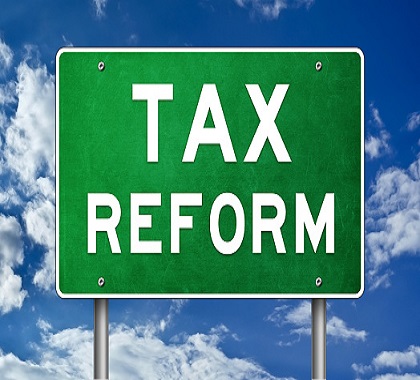Congressional Republicans unveiled the Tax Cuts and Jobs Act, a bill proposing to reduce the number of personal income tax brackets from seven to four, cut taxes by about $1.51 trillion over the next ten years, and make other changes to the federal tax code.
Public debate over the bill, sponsored by Rep. Kevin Brady (R-TX), began on November 6.
R-E-F-O-R-M Spells ‘Relief’
Jonathan Williams, chief economist and vice-president of the American Legislative Exchange Council’s Center for State Fiscal Reform, says the tax reform bill offers long-overdue relief for taxpayers.
“We have suffered through the weakest economic recovery following a recession since World War II,” Williams said. “Our economy needs pro-growth tax relief. The proposed $1.5 trillion net tax cut should benefit individuals and families of all types.”
Reducing Business Burdens
The bill will boost economic prosperity for workers and business owners, Williams says.
“As we always say, businesses don’t pay taxes, people do,” Williams said. “The reduction in the corporate tax rate will provide a much-needed economic boost for all Americans. While some of the benefit from business tax cuts might come in the form of lower prices or better returns on investments like 401(k)s, working Americans will enjoy a significant boost in wages,” Williams said.
Allowing Tax Competition to Work
Removing the state and local tax deduction (SALT), a federal tax break for money already spent on local and state taxes, will promote better state government tax policies, Williams says.
“Those state and local policymakers who refuse to address overspending and their lack of tax competitiveness will lose a good portion of the federal tax subsidy from the SALT deduction,” Williams said. “That’s a good thing for tax competition across states, and ultimately all American taxpayers.”
Includes Other Positive Reforms
Dan Pilla, one of the country’s premier tax experts, says relieving business owners’ corporate tax burdens is a central part of the tax bill.
“A key element to the bill would be the reduction of the corporate tax rate from its rate now of 35 percent,” Pilla said. “They would drop it to 20 percent, which would be a very good thing. Right now, I believe the average corporate tax rate in the industrialized world is about 22.5 percent. We are, by far, the highest at the current time. If we go to 20 percent, we would be below average, which would make the United States an attractive place for businesses to come, build, produce, and establish infrastructure. That would be a good thing, no doubt about that.”
Allowing full expensing for capital investments is another positive part of the bill, Pilla says.
“Another element that’s very positive for business is the expensing provision.” Pilla said. “Right now, generally, businesses have to depreciate the money they put into capital over time. Tools, equipment, infrastructure… that sort of thing has be to recaptured over time, through the process of depreciation. Under the new bill, there would be an unlimited expensing provision, so that if a business spent $1 million on tools or equipment, they could write that off the year they expended the money in. That would be, obviously, better for businesses, to be able to recapture their investments.”
More Reforms Needed
H.R. 1 is a step in the right direction, but the system needs further reform, Pilla says.
“I’m not saying it’s not a positive thing, but it’s not fundamental tax reform,” Pilla said. “There’s all kinds of things that were done in 1986 that are being proposed to be repeated here, and a lot of these things are favorable, but it’s not fundamental tax reform. We still need fundamental tax reform.”




